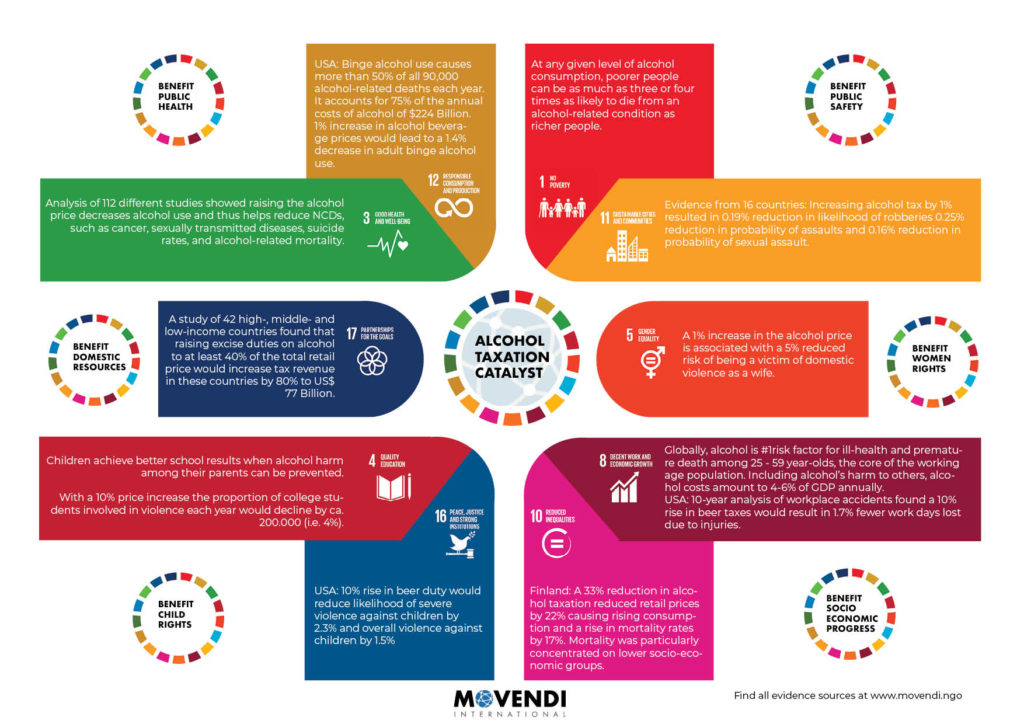
$15 million philanthropic award doubles existing global funding; RESET Alcohol will work in fifteen countries primarily in Latin America, Africa, Asia, with GiveWell as the donor. Public health work to protect more people from alcohol harm is vastly underfunded relative to the alcohol burden, and the philanthropic award that founds RESET Alcohol roughly doubles existing global funding.
RESET Alcohol is a collaboration of six global organizations: Vital Strategies, which is leading the initiative; Movendi International; the University of Illinois Chicago; the Global Alcohol Policy Alliance (GAPA); the Non-Communicable Disease (NCD) Alliance; and World Health Organization (WHO).
RESET Alcohol is an initiative that brings together national governments, civil society, research organizations, and global leaders in public health and alcohol policy to develop and implement evidence-based alcohol policies from the World Health Organization’s WHO) SAFER technical package.
Over three years, the initiative will support 15 or more countries to develop policies including raising the price of alcohol via taxation, regulating availability, and restricting alcohol marketing.
RESET Alcohol will provide technical support to governments, improve national research and data collection, resource advocacy for policy change, and mount communications campaigns.
RESET Alcohol’s primary policy focus will be on increasing alcohol taxation from a public health perspective and to help governments improve other alcohol pricing policies to reduce alcohol affordability. Alcohol taxation is the single most cost-effective alcohol policy solution.
RESET Alcohol also aims to partner with governments to advance evidence-based solutions to reduce alcohol availability and protect people and communities from alcohol advertising, sponsorship, and promotion.
Every year, alcohol use cuts millions of lives short and causes even more widespread suffering,” said Adam Karpati, senior vice president at Vital Strategies, as per Health Policy Watch.
The onus can’t be on individuals. We must reset from an environment where the alcohol industry is empowered to push alcohol into nearly every aspect of our lives, including schools, sports, and media. We need policies that protect kids, make healthy choices, the easy choices, and check the industry’s influence. RESET Alcohol will do just that through strong partnerships with government and civil society leaders who are committed to action.”
Adam Karpati, senior vice president, Vital Strategies
Movendi International provides two Special Features on alcohol taxation and more than 550 resource articles about alcohol taxation.

This situation as observed in different countries across the world counters the traditional finding that tobacco and alcohol tax increases, by themselves, are regressive – leading to the largest percentage reductions in pre-tax incomes for the lowest-income households.
But the picture changes markedly when the benefits of reduced mortality and morbidity are included. These benefits are strongly progressive, for two reasons.”
Lesotho: Estimated Revenue Impact of Proposed Tobacco and Alcohol Levy, Final Report, World Bank Group Team, January 25, 2017, Executive Summary
Alcohol and tobacco taxation are progressive in two aspects:
Public health-oriented taxes on tobacco and alcohol are non-distortionary taxes. They have a triple benefit:
Besides revenue raising objectives, the rationale for excise taxes on alcohol is to reflect their harmful external costs. The benefits of higher alcohol taxes are obvious for individuals and entire communities. The benefits result from:
Nevertheless, in many countries, current alcohol tax rates are evidently far below what is feasible in terms of revenue potential and what is needed to achieve development targets, according to the World Bank.
A study published in The Lancet is providing ground-breaking analysis: the most effective alcohol policy solutions have declined between 2015 and 2020, while it improved for tobacco policies. In fact, the alcohol policy best buys are “systematically neglected at the global level.”
In this episode host Maik Dünnbier talks with Dr. Evan Blecher of the World Health Organization focusing on pro-health taxes and specifically the design, potential, and window of opportunity for better alcohol taxation.
Evan and host Maik go deep into the weeds of health taxes, focusing more specifically on alcohol excises taxes. They discuss different terms for health taxes and what they reveal about the purpose and potential of health taxes.